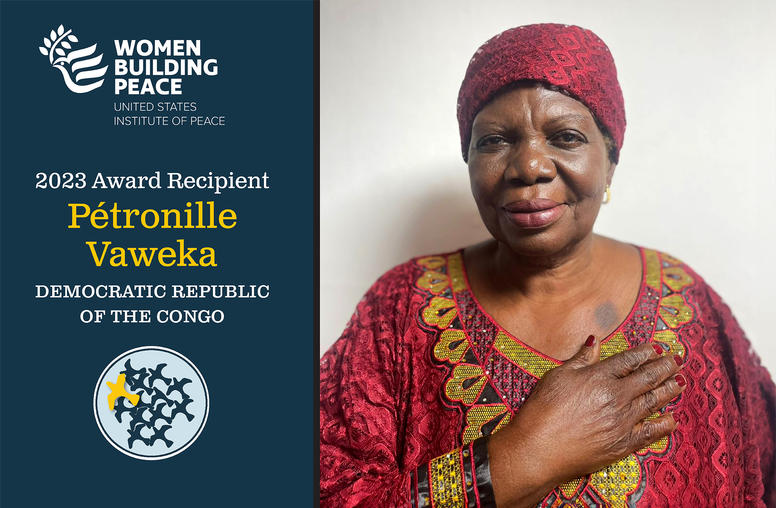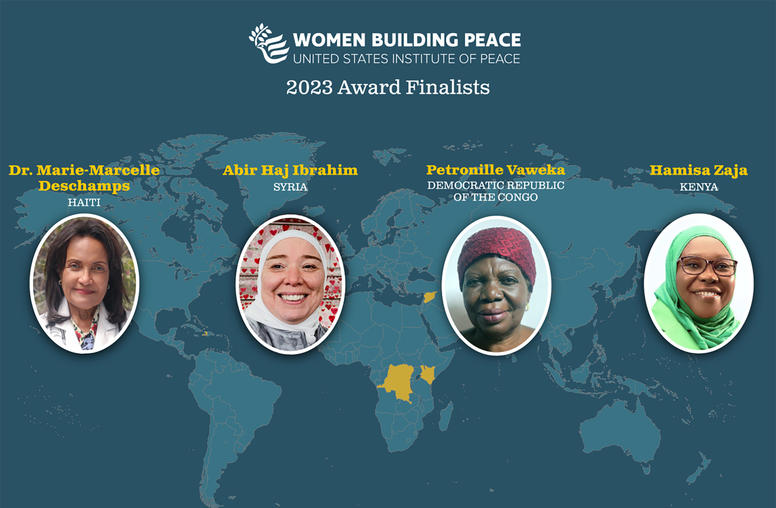"Intervention in the Kosovo Crisis"
Institute co-sponsors simulation exercise for students with the Atlantic Council.
WASHINGTON -- How can college students from across the nation work together with leading foreign policy makers and international experts to potentially avert a future crisis in Kosovo? On April 25th, students from over 35 colleges and universities around the U.S. -- in conjunction with universities in France, Greece, Italy, Russia, the Czech Republic, Finland, and Ukraine -- participated in a live interactive webcast as part of the conclusion of the Atlantic Council's 2000 Crisis Game program.
Hosted by the United State Institute of Peace, the live two-hour webcast allowed college students to discuss the results of their recent crisis simulation on Kosovo with senior government policymakers and leading experts on the Balkans. The heart of the event featured questions e-mailed from participating universities around the globe to the panel of experts. Guest speakers during the webcast included: U. S. Department of State Deputy Assistant Secretary for Population, Refugees and Migration Marguerite Rivera Houze; International Crisis Group Balkans expert John Fawcett; and Daniel Serwer, director of the Institute's Balkans Initiative and former U.S. Special Envoy for the Bosnian Federation. The panel was moderated by Institute Executive Vice President and Balkans specialist Harriet Hentges
According to Institute Education Program Director Pamela R. Aall: "What makes this simulation unique is not only the chance for the students to gain hands-on experience in international conflict resolution, but the chance to discuss their lessons learned with policymakers and experts dealing with complicated international conflicts everyday here in Washington."
Administered annually by the Atlantic Council's Office of Education and the Successor Generations, the Atlantic Crisis Game is designed to allow college and university students an opportunity to explore the links between foreign policy theory and real policy practice. Targeted specifically for use in college political science and history courses, students in this year's 2000 Atlantic Crisis Game were challenged to react and attempt to develop strategies to successfully advert a potential international crisis resulting from a simulated Serbian attack on KFOR forces in Kosovo.
Founded in 1961, the Atlantic Council is a non-partisan, educational, tax-exempt organization committed to enhancing U.S. initiative and leadership through sound and skillfully administered policies that identify and pursue national interests through the education of future leaders.
The United States Institute of Peace is an independent institution created and funded by Congress to promote research, education, and training on the peaceful resolution of international conflicts. Through a series of seminars, scholarships, research resources, and teaching materials, the Institute's Education Program seeks to address the needs of educators, students, scholars, practitioners, and the public to understand the complexities of international conflicts and approaches to peace.
Participating Universities
Aristotle University of Thessaloniki
Thessaloniki, Greece
Baylor University
Waco, Texas
Centre College
Danville, Kentucky
College of William and Mary
Williamsburg, Virginia
Creighton University
Omaha, Nebraska
Drew University
Madison, New Jersey
Elizabeth City State University
Elizabeth City, North Carolina
European University Institute
Florence, Italy
Florida International University
Miami, Florida
Far Eastern State University
Vladivostok, Russia
George Mason University
Fairfax, Virginia
Georgetown University
Washington, DC
Georgia Institute of Technology
Atlanta, Georgia
Indiana University
Bloomington, Indiana
Institut d'Etudes Politiques de Paris
Paris, France
Center for Conflict Studies Resolution
Zurich, Switzerland
Kent State University
Kent, Ohio
Lafayette College
Easton, Pennsylvania
Louisiana State University
Baton Rouge, Louisiana
Masaryk University Brno
Brno, Czech Republic
McKendree College
Lebanon, Illinois
Michigan State University
East Lansing, Michigan
Middlebury College
Middlebury, Vermont
National Defense College
Helsinki, Finland
New York University in Florence
Florence, Italy
Princeton University
Princeton, New Jersey
Ripon College
Ripon, Wisconsin
South Dakota State University
Brookings, South Dakota
Southern Arkansas University
Magnolia, Arkansas
St. Mary's College of Maryland
St. Mary's City, Maryland
St. Petersburg State University
St. Petersburg, Russia
Wheaton College
Wheaton, Illinois
Stephen F. Austin State University
Nacogdoches, Texas
Tulane University
New Orleans, Louisiana
University of Athens
Athens, Greece
Universitá Roma Tré
Rome, Italy
University of Hartford
Hartford, Connecticut
University of Kiev-Mohyla Academy
Kiev, Ukraine
University of Miami
Miami, Florida
University of North Dakota
Grand Forks, North Dakota
University of North Texas
Denton, Texas
University of Oregon
Eugene, Oregon
University of Pennsylvania
Philadelphia, Pennsylvania
University of Puget Sound
Tacoma, Washington
University of the South
Sewanee, Tennessee
University of Wisconsin-Stevens Point
Stevens Point, Wisconsin

